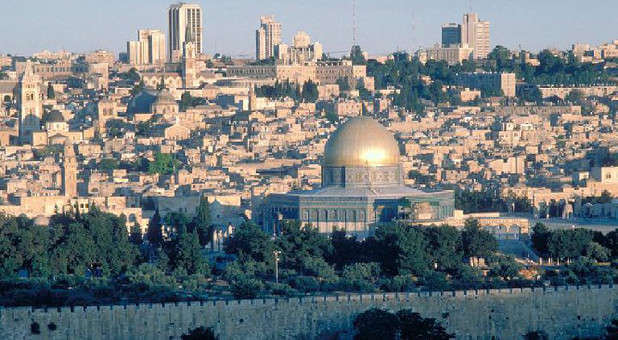I just came back from an extended trip overseas. For more than a week after my return home, nothing required me to be in Jerusalem, as I am on a regular basis.
When I went arrived in Jerusalem for the first time after this long absence, I felt uneasy in the realization that it had been close to a month since I had last been there. Though the center of Jerusalem is visible from my neighborhood, without a doubt, this had been the longest period of time that I had not been in Jerusalem since moving to Israel.
Though I didn’t feel the absence of Jerusalem until I returned, I realized Jerusalem was missing from my life.
Jewish tradition teaches that when one enters Jerusalem for the first time, or after an absence of at least six months, we recite the shehechiyanu blessing:
“Blessed are you, Lord our God, King of the universe, who has granted us life, sustained us, and enabled us to reach this occasion.”
This makes sense because in the time of the Temple, Jews ascended to Jerusalem three times a year for the festivals Passover, Shavuot and Sukkot. So if someone missed one of these, it’s intuitive that more than six months could have passed, and the pace of what was the norm in life then would have been upset. Today, not being in Jerusalem for this extended period still warrants an expression of joy in the shehechiyanu upon returning.
We recite shehechiyanu on many special occasions; sometimes to remind us of the period into which we are entering, sometimes upon seeing, hearing or doing something for the first time (in a long time). While the experiences are individual, we recite shehechiyanu in the plural. This shows a profound sense of community embodied in Judaism, even though I may be alone and experiencing something on my own at the time.
Driving through Jerusalem between meetings that day, I pondered another tenet of Judaism, Psalm 137:5: “If I forget you, O Jerusalem, let my right hand forget its skill.”
I wondered why we are told not to forget Jerusalem, rather than, proactively, that we must remember. To remember is active, compared to a passive word, forget. One definition of forget seems to fit best with my experience, that to forget is “to fail to think of.”
But what I realized is that while one can forget something mundane (a birthday, to take out the garbage, to do homework, etc.), literal forgetting is finite. In this way, forgetting Jerusalem would be grave.
Other than being glad to be back home and in Jerusalem, this experience emblazoned on my heart not only how central Jerusalem is to me as a Jew and as an Israeli, but as a person. Maybe these are inseparable. The absence from Jerusalem is profound. The return to Jerusalem is extraordinary.
Years ago, I was interviewed as a new immigrant, about my experiences in Israel, and to encourage others to consider moving to Israel as well. I recall answering one of the questions in a way that was so deep, that I still remember it (not, not forgetting it), to this day.
I shared that when living here and raising my family, not only are we privileged to be part of living God’s prophecy, but that this plays out in every day of our lives. However, one needs to have the awareness and humility that even the most ordinary things are, in fact, extraordinary.
I gave the example that when I go the mall, I go to the mall IN JERUSALEM. When I take my clothes to the dry cleaner, I take them to a dry cleaner IN JERUSALEM. When I go shopping for groceries or to fill up my car with gas, I often go shopping IN JERUSALEM. Even when I take my kids to the dentist, I take them to the dentist, IN JERUSALEM.
It’s very easy to take this all for granted, to forget the significance of the Jewish people returning to Jerusalem after nearly 2000 years. People forget things, our lives are busy, and sometimes we stare straight through miracles that happen before us every day.
But my experience taught me something profound, that every time I leave my house for the 11-kilometer drive to the southern entrance of Jerusalem, I need to remember, actively and proactively, that I am about to do something that Jews yearned for and only dreamed about for thousands of years, and that I am privileged to do so often that I even risk forgetting this important lesson. I certainly can’t forget that.
Personally and very vividly, while we imported five of our six children from the U.S. with us, our youngest was born in Israel—in Jerusalem. He had little to do with being born, it was an action that happened to him, rather than something that he choose to do. However, after absorbing the miracle of my youngest son’s birth, I had the awareness that just by virtue of his being born in Jerusalem, our lives are forever linked to the past and future here, of God’s promise, and His prophecy.
I pray for the presence of mind always to remember this, and never to forget.
Jonathan Feldstein is the Israel Representative for the American Friends of Magen David Adom and Director of Heart to Heart, a unique virtual blood donation program to save lives and bless Israel. Born and educated in the U.S., Jonathan emigrated to Israel in 2004. He is married and the father of six. Throughout his life and career he has been blessed by the calling to fellowship with Christian supporters of Israel and share experiences of living as an Orthodox Jew in Israel. He can be contacted at [email protected].














































